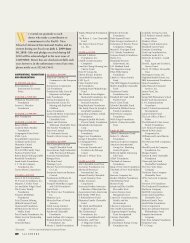Download Current Issue - SAIS
Download Current Issue - SAIS
Download Current Issue - SAIS
Create successful ePaper yourself
Turn your PDF publications into a flip-book with our unique Google optimized e-Paper software.
Large-scale farming facilitated by<br />
corporate agriculture can produce<br />
benefits such as job creation, infrastructure<br />
development, technology<br />
transfer, increased food security, better<br />
balance of payments through exports,<br />
and improved access to both international<br />
and local markets. Yet some critics<br />
have castigated foreign investment<br />
in corporate farming as “land grabbing”<br />
and argued that the potential<br />
costs of internationalized agriculture<br />
may include the loss of customary<br />
landholdings and expulsion of local<br />
inhabitants, unregulated environmental<br />
damage and even threats to local<br />
food security. The ongoing discussion<br />
about the relative costs and benefits of<br />
international corporate farming shows<br />
the increased attention to economic<br />
issues in the international debate over<br />
the nature of human rights.<br />
The United States has been outspoken<br />
about the importance of fighting<br />
hunger and has pledged to support a<br />
policy of “global food security.” At the<br />
G-8 summit in L’Aquila, Italy, in 2009,<br />
President Barack Obama committed<br />
$3.5 billion to support women’s roles<br />
“as critical drivers of agriculture-led<br />
economic growth in developing countries.”<br />
Women, he noted, constitute<br />
the majority of smallholder farmers in<br />
many developing countries yet often<br />
lack access to capital. Two talented<br />
Americans—Josette Sheeran (<strong>SAIS</strong>’s<br />
2011 commencement speaker) and<br />
previously Catherine Bertini (now on<br />
the faculty at Syracuse University)—<br />
have served as innovative executive<br />
directors of the U.N. World Food<br />
Programme. Under their leadership,<br />
the WFP has acknowledged that famine<br />
response in the developing world<br />
should draw on local as well as international<br />
sources of food so as not to<br />
displace local farmers.<br />
But the United States has also been<br />
cautious in framing access to food as<br />
a formal international “human right.”<br />
This caution was reflected in the Carter<br />
administration’s decision, in signing the<br />
International Covenant on Economic,<br />
Social and Cultural Rights, to provide<br />
that the rights in the covenant could<br />
not be considered “self-executing” in<br />
American law. Even the United Nations<br />
58 <strong>SAIS</strong>PHERE<br />
treaty-monitoring Committee on Economic,<br />
Social and Cultural Rights, sitting<br />
in Geneva, has recognized that the<br />
limits of public financing and the key<br />
role of the market mean that economic<br />
and social rights can be measured only<br />
against a standard of “progressive realization.”<br />
Nonetheless, the committee<br />
recently gained additional powers to<br />
take individual complaints under an<br />
optional protocol, which would allow<br />
U.N. monitors to decide individual<br />
cases of claimed economic rights in<br />
countries that agree.<br />
A Right to Adequate Food?<br />
Within the international human rights<br />
community, the right to be free from<br />
starvation is taken to be the prerequisite<br />
to the enjoyment of other human<br />
rights. In General Comment No. 12,<br />
the Geneva monitoring committee on<br />
economic and social rights opined that<br />
a “human right to adequate food is of<br />
crucial importance for the enjoyment of<br />
all rights.” Thus, the impact of international<br />
economic policy on the supply of<br />
food to affected communities is likely to<br />
be seen in a broad framework.<br />
Agriculture and land policy in Africa<br />
may attract attention from one other<br />
human rights body. Though there is no<br />
express “right to food” in the African<br />
Charter on Human and Peoples’ Rights,<br />
the African Commission on Human<br />
and Peoples’ Rights has read a “right to



